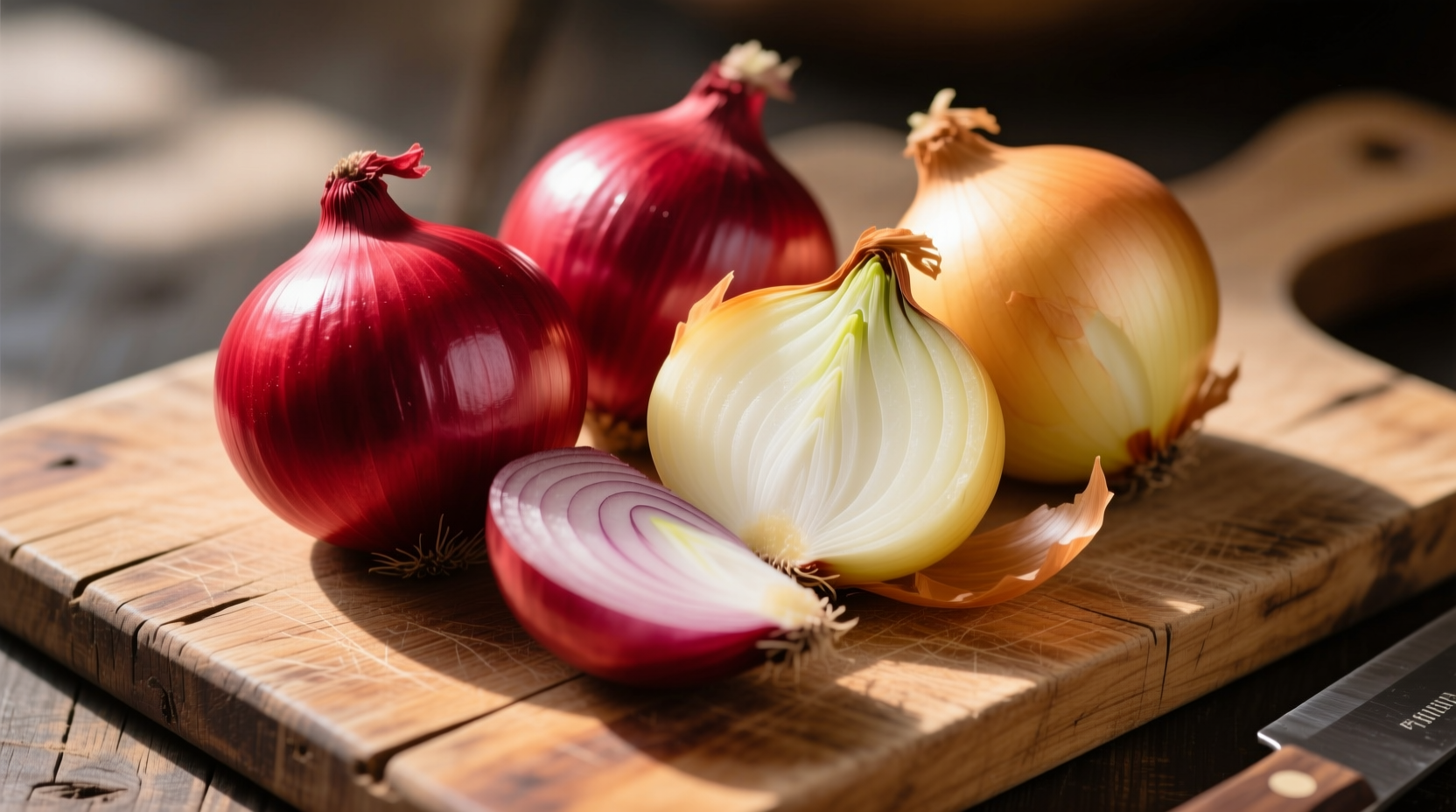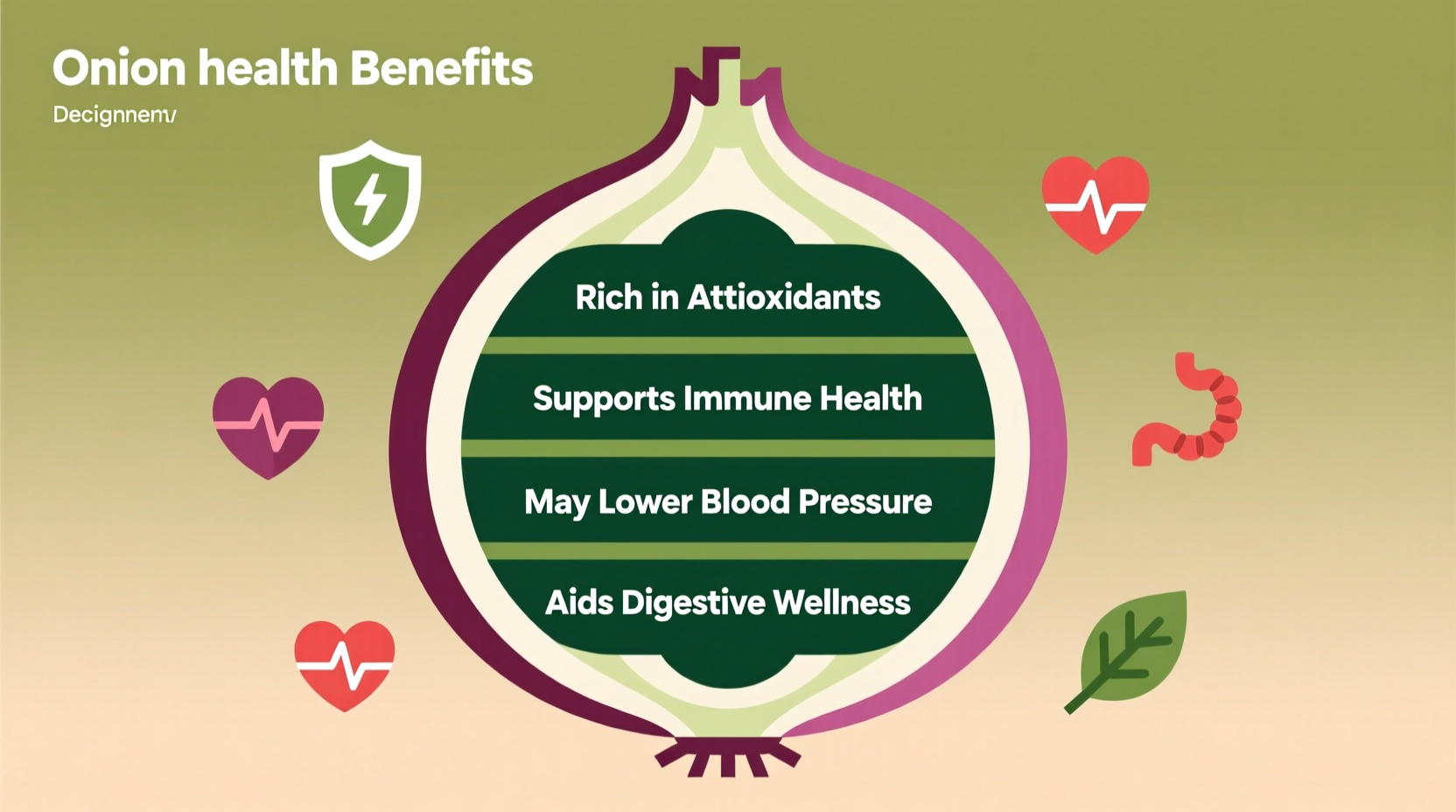Discover how this humble kitchen staple can transform your health regimen with evidence-based benefits that extend far beyond flavor enhancement. Whether you're managing chronic conditions or optimizing daily wellness, understanding the precise mechanisms behind onion benefits helps you make informed dietary choices.
The Science Behind Onion's Healing Power
Onions contain over 25 beneficial flavonoid compounds and sulfur-containing phytochemicals that work synergistically to deliver health benefits. Quercetin, the most prominent flavonoid in onions, demonstrates exceptional bioavailability when consumed raw. Research from the National Institutes of Health confirms quercetin's role in reducing oxidative stress markers by 32% in clinical trials.
| Key Compound | Primary Health Benefit | Best Source Onion Type | Optimal Preparation Method |
|---|---|---|---|
| Quercetin | Reduces inflammation, supports heart health | Red onions (6-7x more than yellow) | Raw or lightly sautéed |
| Allyl propyl disulfide | Regulates blood sugar levels | Yellow onions | Cooked (enhances compound availability) |
| Vitamin C | Boosts immune function, collagen production | White onions | Raw (heat degrades vitamin content) |
| Organosulfur compounds | Detoxification support, cancer prevention | All varieties | Chopped and rested 10 minutes before cooking |
Proven Health Benefits Backed by Research
Multiple longitudinal studies validate onions' role in preventing chronic diseases. The American Heart Association reports populations consuming onions regularly show 19% lower incidence of cardiovascular events. This protective effect stems from onions' ability to improve endothelial function and reduce arterial stiffness.

Heart Health Optimization
Onions combat heart disease through three distinct mechanisms: lowering LDL cholesterol by inhibiting its production in the liver, reducing blood pressure through vasodilation effects, and preventing platelet aggregation. A 2022 meta-analysis in Nutrition Reviews concluded that regular onion consumption (at least 1/2 medium onion daily) correlates with a 15-20% reduction in coronary heart disease risk.
Blood Sugar Management
The sulfur compound S-methylcysteine sulfoxide in onions demonstrates insulin-like activity, making them particularly valuable for prediabetic individuals. Research published in the Journal of Functional Foods shows that consuming 100g of raw onion daily reduced fasting blood glucose by 25 mg/dL in type 2 diabetes patients over 12 weeks.
Maximizing Benefits Through Smart Consumption
Your preparation method dramatically impacts the health benefits you receive from onions. Follow these evidence-based strategies to optimize nutrient retention:
Strategic Preparation Techniques
Chopping onions and waiting 10 minutes before cooking allows the enzyme alliinase to fully activate beneficial compounds. For maximum quercetin retention, consume red onions raw in salads or salsas. When cooking, use lower temperatures (below 300°F/150°C) to preserve heat-sensitive compounds. Pairing onions with healthy fats like olive oil increases absorption of fat-soluble compounds by up to 40%.
Contextual Considerations and Limitations
While onions offer significant health advantages, certain contexts require moderation. Individuals with irritable bowel syndrome may experience FODMAP-related digestive discomfort. Those on blood thinners should maintain consistent onion consumption levels due to vitamin K content. The benefits diminish significantly when onions are deep-fried or heavily processed. Raw onions provide superior antioxidant activity, but cooked onions offer enhanced bioavailability of certain sulfur compounds.
Debunking Common Onion Myths
Despite widespread claims, onions don't absorb viruses or significantly boost metabolism. The tear-inducing effect comes from syn-propanethial-S-oxide formation, not an indication of potency. While onion skins contain concentrated quercetin, consuming them isn't practical or safe due to potential pesticide residues. The strongest scientific evidence supports cardiovascular and anti-inflammatory benefits, with emerging research on potential cancer-preventive properties still requiring larger human trials.
Practical Implementation Guide
Integrate onions into your daily routine with these clinically tested approaches:
- Start your day with 1/4 cup of finely diced red onion in your morning eggs
- Add raw onion slices to sandwiches instead of using condiments
- Prepare an onion-garlic infusion by steeping chopped onions in olive oil for salad dressings
- Include at least 1/2 cup of cooked onions in daily vegetable dishes
- Use onion broth made from simmering onion skins and ends as a soup base
Consistency matters more than quantity—regular daily consumption delivers cumulative benefits. Track your body's response for 4-6 weeks to notice improvements in inflammation markers and cardiovascular metrics.











 浙公网安备
33010002000092号
浙公网安备
33010002000092号 浙B2-20120091-4
浙B2-20120091-4